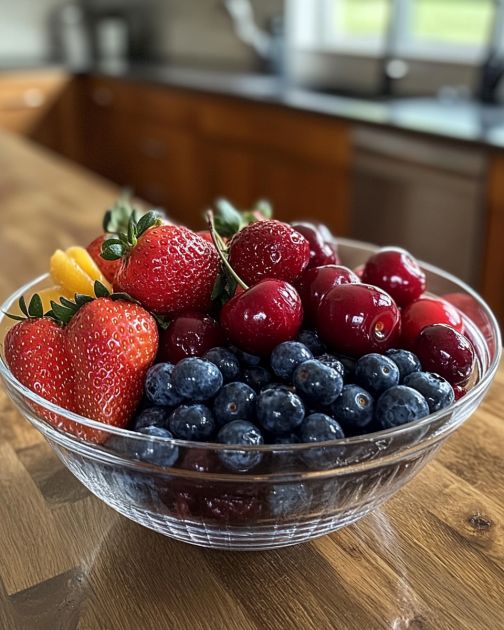Introduction
Summer fruits like peaches and strawberries are packed with nutrients and flavor—but keeping them fresh without refrigeration is a challenge. My mom, a culinary enthusiast, developed a simple, natural preservation method that keeps fruits fresh for weeks. It’s incredibly effective and easy to use.
1. The Importance of Preserving Summer Fruits
Summer fruits are rich in vitamins and antioxidants—strawberries provide vitamin C and manganese, while peaches offer vitamin A and potassium. Without proper storage, these fruits can lose up to 30% of their nutrients in a week. Preserving them helps reduce food waste and maintains nutritional value.
2. Understanding the Natural Ripening Process
Fruits ripen due to ethylene gas, which converts starches into sugars. This process affects texture, color, and flavor. Some fruits, like bananas, emit more ethylene and can speed up the ripening of nearby produce. Managing ethylene exposure is key to slowing down ripening.
3. The Secret Ingredient: A Natural Preservative
My mom’s secret? Citric acid, found in lemons and limes. It’s a natural antioxidant that prevents browning and bacterial growth. Combined with salt, it helps create an acidic, low-moisture surface that keeps fruit fresh and tasty.
4. Step-by-Step Guide to Preparing the Solution
SEE NEXT PAGE
Introduction
Summer fruits like peaches and strawberries are packed with nutrients and flavor—but keeping them fresh without refrigeration is a challenge. My mom, a culinary enthusiast, developed a simple, natural preservation method that keeps fruits fresh for weeks. It’s incredibly effective and easy to use.
1. The Importance of Preserving Summer Fruits
Summer fruits are rich in vitamins and antioxidants—strawberries provide vitamin C and manganese, while peaches offer vitamin A and potassium. Without proper storage, these fruits can lose up to 30% of their nutrients in a week. Preserving them helps reduce food waste and maintains nutritional value.
2. Understanding the Natural Ripening Process
Fruits ripen due to ethylene gas, which converts starches into sugars. This process affects texture, color, and flavor. Some fruits, like bananas, emit more ethylene and can speed up the ripening of nearby produce. Managing ethylene exposure is key to slowing down ripening.
3. The Secret Ingredient: A Natural Preservative
My mom’s secret? Citric acid, found in lemons and limes. It’s a natural antioxidant that prevents browning and bacterial growth. Combined with salt, it helps create an acidic, low-moisture surface that keeps fruit fresh and tasty.
4. Step-by-Step Guide to Preparing the Solution

